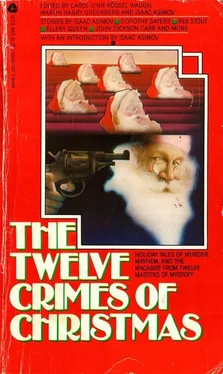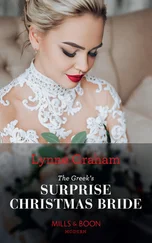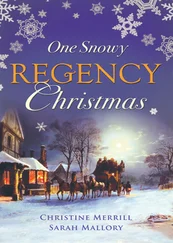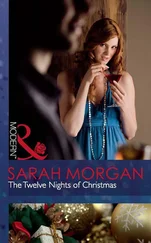Carol-Lynn Waugh - The Twelve Crimes of Christmas
Здесь есть возможность читать онлайн «Carol-Lynn Waugh - The Twelve Crimes of Christmas» весь текст электронной книги совершенно бесплатно (целиком полную версию без сокращений). В некоторых случаях можно слушать аудио, скачать через торрент в формате fb2 и присутствует краткое содержание. Жанр: Триллер, на английском языке. Описание произведения, (предисловие) а так же отзывы посетителей доступны на портале библиотеки ЛибКат.
- Название:The Twelve Crimes of Christmas
- Автор:
- Жанр:
- Год:неизвестен
- ISBN:нет данных
- Рейтинг книги:3 / 5. Голосов: 1
-
Избранное:Добавить в избранное
- Отзывы:
-
Ваша оценка:
- 60
- 1
- 2
- 3
- 4
- 5
The Twelve Crimes of Christmas: краткое содержание, описание и аннотация
Предлагаем к чтению аннотацию, описание, краткое содержание или предисловие (зависит от того, что написал сам автор книги «The Twelve Crimes of Christmas»). Если вы не нашли необходимую информацию о книге — напишите в комментариях, мы постараемся отыскать её.
The Twelve Crimes of Christmas — читать онлайн бесплатно полную книгу (весь текст) целиком
Ниже представлен текст книги, разбитый по страницам. Система сохранения места последней прочитанной страницы, позволяет с удобством читать онлайн бесплатно книгу «The Twelve Crimes of Christmas», без необходимости каждый раз заново искать на чём Вы остановились. Поставьте закладку, и сможете в любой момент перейти на страницу, на которой закончили чтение.
Интервал:
Закладка:
“In the corner by one bookcase, he said out loud: ‘I’m tired of this silly, rotten game; go away, do you hear?’ Nobody there had ever heard him speak like that, in such a loud, wild way, but they laughed and thought it must be the Kentish cider. ‘Go away!” cried Mr. Wilkes again, and began to strike at it with his fist. All this time, Miss Abbott says, she had observed his face gradually changing. He dodged again, very pleasant and nimble for such a big man, but with the perspiration running down his face. Back across the room he went again, with it following him; and he cried out something that most naturally shocked them all inexpressibly.
“He screamed out: ‘For God’s sake, Fenton, take it off me!’
“And for the last time the thing jumped.
“They were over near the curtains of that bay window, which were drawn, as they are now. Miss Twigelow, who was nearest, says that Mr. Wilkes could not have seen anything, because the white bag was still drawn over the woman’s head. The only thing she noticed was that at the lower part of the bag, where the face must have been there was a curious kind of discoloration, a stain of some sort, which had not been there before: something seemed to be seeping through. Mr. Wilkes fell back between the curtains, with the hooded person after him, and screamed again. There was a kind of thrashing noise in or behind the curtains; then they fell straight again, and everything grew quiet.
“Now, our Kentish cider is very strong, and for a moment Mr. Fenton did not know what to think. He tried to laugh at it, but the laugh did not sound well. Then he went over to the curtains, calling out gruffly to them to come out of there and not play the fool. But after he had looked inside the curtains, he turned round very sharply and asked the rector to get the ladies out of the room. This was done, but Miss Abbott often said that she had one quick peep inside. Though the bay windows were locked on the inside, Mr. Wilkes was now alone on the window seat. She could see his beard sticking up, and the blood. He was dead, of course. But, since he had murdered Jane Waycross, I sincerely think that he deserved to die.”
For several seconds the two listeners did not move. She had all too successfully conjured up this room in the late ’seventies, whose stuffiness still seemed to pervade it now.
“But look here!” protested Hunter, when he could fight down an inclination to get out of the room quickly. “You say he killed her after all? And yet you told us he had an absolute alibi. You said he never went closer to the house than the windows…”
“No more he did, my dear,” said the other.
“He was courting the Linshaw heiress at the time,” she resumed; “and Miss Linshaw was a very proper young lady, who would have been horrified if she had heard about him and Jane Waycross. She would have broken off the match, naturally. But poor Jane Waycross meant her to hear. She was much in love with Mr. Wilkes, and she was going to tell the whole matter publicly: Mr. Wilkes had been trying to persuade her not to do so.”
“But-”
“Oh, don’t you see what happened?” cried the other in a pettish tone. “It is so dreadfully simple. I am not clever at these things, but I should have seen it in a moment, even if I did not already know. I told you everything so that you should be able to guess.
“When Mr. Wilkes and Dr. Sutton and Mr. Pawley drove past here in the gig that night, they saw a bright light burning in the windows of this room. I told you that. But the police never wondered, as anyone should, what caused that light. Jane Waycross never came into this room, as you know; she was out in the hall, carrying either a lamp or a candle. But that lamp in the thick blue-silk shade, held out there in the hall, would not have caused a bright light to shine through this room and illuminate it. Neither would a tiny candle; it is absurd. And I told you there were no other lamps in the house except some empty ones waiting to be filled in the back kitchen. There is only one thing they could have seen. They saw the great blaze of the paraffin oil round Jane Waycross’s body.
“Didn’t I tell you it was dreadfully simple? Poor Jane was upstairs waiting for her lover. From the upstairs window she saw Mr. Wilkes’s gig, with the fine yellow wheels, drive along the road in the moonlight, and she did not know there were other men in it; she thought he was alone. She came downstairs-
“It is an awful thing that the police did not think more about that broken medicine bottle lying in the hall, the large bottle that was broken in just two long pieces. She must have had a use for it; and, of course, she had. You knew that the oil in the lamp was almost exhausted, although there was a great blaze round the body. When poor Jane came downstairs, she was carrying the unlighted lamp in one hand; in the other hand she was carrying a lighted candle and an old medicine bottle containing paraffin oil. When she got downstairs, she meant to fill the lamp from the medicine bottle, and then light it with the candle.
“But she was too eager to get downstairs, I am afraid. When she was more than halfway down, hurrying, that long nightgown tripped her. She pitched forward down the stairs on her face. The medicine bottle broke on the tiles under her, and poured a lake of paraffin round her body. Of course, the lighted candle set the paraffin blazing when it fell; but that was not all. One intact side of that broken bottle, long and sharp and cleaner than any blade, cut her throat when she fell on the smashed bottle. She was not quite stunned by the fall. When she felt herself burning, and the blood almost as hot, she tried to save herself. She tried to crawl forward on her hands, forward into the hall, away from the blood and oil and fire.
“That was what Mr. Wilkes really saw when he looked in the window.
“You see, he had been unable to get rid of the two fuddled friends, who insisted on clinging to him and drinking with him. He had been obliged to drive them home. If he could not go to ‘Clearlawns’ now, he wondered how at least he could leave a message; and the light in the window gave him an excuse.
“He saw pretty Jane propped up on her hands in the hall, looking out at him beseechingly while the blue flame ran up and turned yellow. You might have thought he would have pitied, for she loved him very much. Her wound was not really a deep wound. If he had broken into the house at that moment, he might have saved her life. But he preferred to let her die, because now she would make no public scandal and spoil his chances with the rich Miss Linshaw. That was why he returned to his friends and told a lie about a murderer in a tall hat. It is why, in heaven’s truth, he murdered her himself. But when he returned to his friends, I do not wonder that they saw him mopping his forehead. You know now how Jane Waycross came back for him, presently.”
There was another heavy silence.
The girl got to her feet, with a sort of bouncing motion which was as suggestive as it was vaguely familiar. It was as though she were about to run. She stood there, a trifle crouched, in her prim brown dress, so oddly narrow at the waist after an old-fashioned pattern; and in the play of light on her face Rodney Hunter fancied that its prettiness was only a shell.
“The same thing happened afterwards, on some Christmas Eves,” she explained. “They played Blind Man’s Bluff over again. That is why people who live here do not care to risk it nowadays. It happens at a quarter past seven-”
Hunter stared at the curtains. “But it was a quarter past seven when we got here!” he said. “It must now be-”
“Oh, yes,” said the girl, and her eyes brimmed over. “You see, I told you you had nothing to fear; it was all over then. But that is not why I thank you. I begged you to stay, and you did. You have listened to me, as no one else would. And now I have told it at last, and now I think both of us can sleep.”
Читать дальшеИнтервал:
Закладка:
Похожие книги на «The Twelve Crimes of Christmas»
Представляем Вашему вниманию похожие книги на «The Twelve Crimes of Christmas» списком для выбора. Мы отобрали схожую по названию и смыслу литературу в надежде предоставить читателям больше вариантов отыскать новые, интересные, ещё непрочитанные произведения.
Обсуждение, отзывы о книге «The Twelve Crimes of Christmas» и просто собственные мнения читателей. Оставьте ваши комментарии, напишите, что Вы думаете о произведении, его смысле или главных героях. Укажите что конкретно понравилось, а что нет, и почему Вы так считаете.












